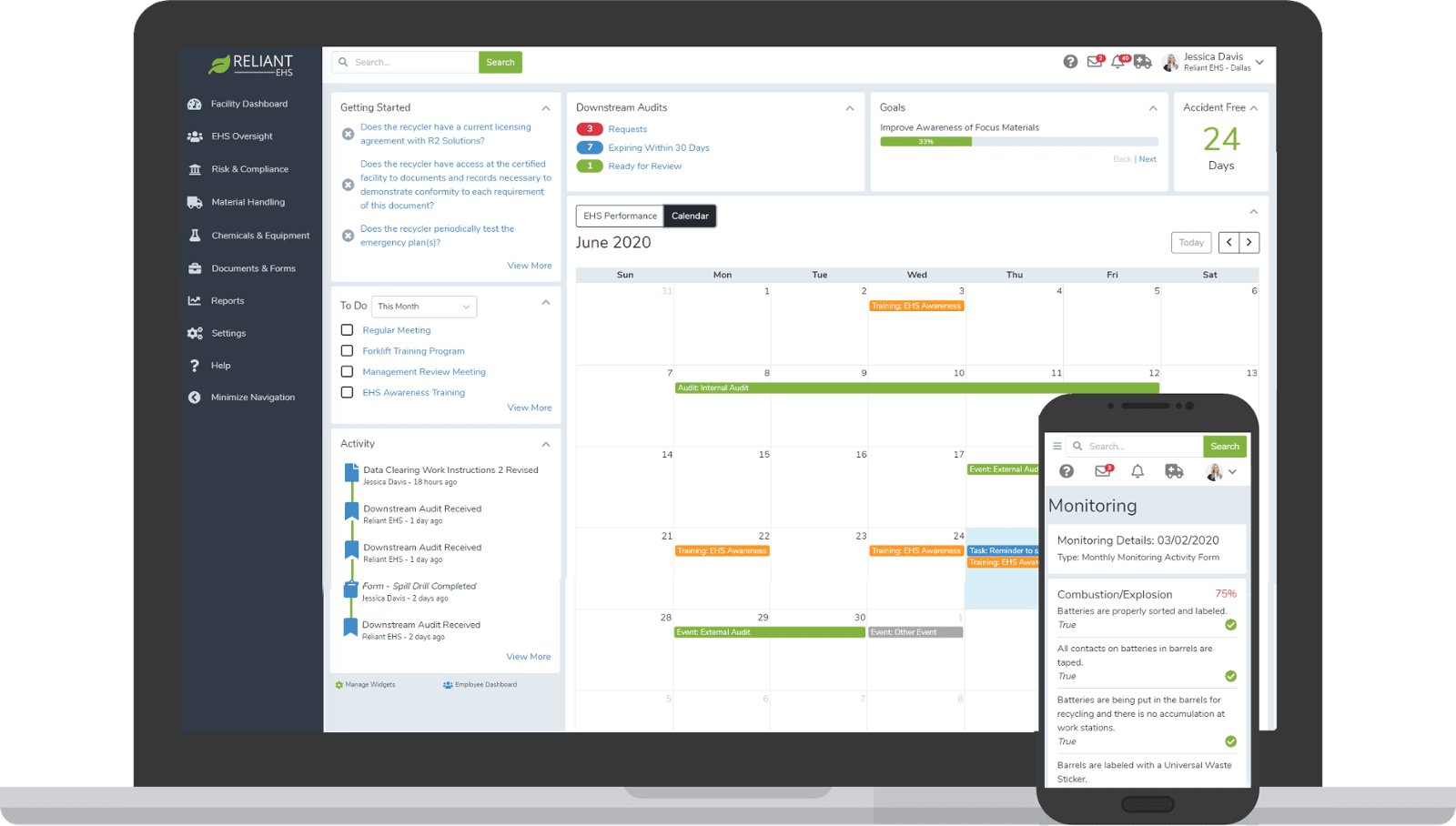The Value of Compliance Management
Compliance Management spans multiple industries, regulations, and industry standards. As a general principal, compliance management accounts for the documentation, monitoring, measurement, and management of actions needed to comply with legal requirements, industry requirements, and in many cases customer requirements that govern how business should be conducted.
Environmental, Health, and Safety (EHS) Management focuses more specifically on the laws, rules, regulations, professions, programs, and workplace efforts to safeguard the health and safety of the workforce and general public as well as the environment from hazards or potential hazards existing in the workplace. EHS is a common abbreviation for these activities, however, you may also see this referred to has EHSQ (Environmental, Health, Safety, and Quality), QEHS, HSE, etc.
The value of a strong EHS program and Safety Culture is far reaching. In addition to establishing and maintaining a safe and healthful workplace, employees feel a sense of responsibility and value in contributing to their own workplace safety resulting in lower rates of accidents and incidents and higher rates of employee satisfaction and better employee retention and productivity.
EHS programs also safeguard company investments by reducing accidents and lowering the potential liability associated with unsafe workplaces. OSHA provides a calculator on their Safety Pays website which estimates the cost of common workplace injuries. Using an example of a small warehouse facility (est. 50 employees) where two injuries occurred in a year produced the following impact to the business.
Injury Type | Instances | Direct Cost | Indirect Cost | Total Cost | Additional Sales (Indirect) | Additional Sales (Total) |
Fracture | 1 | $53,458 | $58,803 | $112,261 | $588,038 | $1,122,610 |
Laceration | 1 | $21,380 | $23,518 | $44,898 | $235,180 | $448,980 |
From these two (seemingly simple) injuries alone, the employer can expect to pay up to $157,159.00 depending on their worker’s compensation policy and would need $1.5M in additional sales at a 10% profit margin to offset the impact of the workplace injuries.
Industry Spotlight: Compliance Management in Electronics (E-Waste) Recycling
Over the past decade, the number of electronic devices owned and used by consumers worldwide has continued to climb. Approximately 15 pounds of used electronics (E-Waste) are generated per capita worldwide – but less than 20% are recycled.
The regulation around the recycling of E-Waste and need for compliance in E-Waste Management has grown consistently over the past decade as a greater focus has been put on sustainability and environmental accountability. In 2014, only 44% of the world population (represented by 61 countries) was covered by E-Waste legislation. By 2017, that number had grown to 66% (represented by 67 countries) and continues to climb. UN agencies have come together with the World Economic Forum, the Global Environment Facility, and the World Business Council for Sustainable Development to address the growing E-Waste problem.
E-Waste in the United States
Americans throw away about 9.4 million tons of electronics every year – more than any other country in the world. Most of this waste is simply dumped rather than recycled, according to the US EPA, with just 12.5% being recycled.
The most wide-spread electronics recycling certification is R2:2013. On average, companies in the E-Waste industry spend $80k - $130k to implement the Responsible Recycling (R2) Standard and $40k P.A. to maintain conformance.

- E-Waste Recycling Compliance: Voluntary, Industry Certifications
- E-Waste laws are created and enforced at the state level (not federally).
- Recycling-Specific Industry Standards – Responsible Recycling (R2), e-Stewards, Recycling Industry Operating Standard (RIOS).
- Other Standards Required: ISO 14001, ISO 9001, ISO 45001, OHSAS 18001, NAID, etc.
- General Safety & Environmental Compliance: Required by Law
E-Waste in Europe
Waste Electrical and Electronic Equipment (WEEE) is one of the fastest growing waste streams in the EU. The EU addressed the growing issue of electronic waste with a directive in 2003 that provided for the creation of “collection schemes” allowing consumers to return their e-waste free of charge.
- WEEE Recycling Compliance: Mandated by Law (WEEE Directives), Industry Certifications Voluntary
- Recyclers are required to inform the European Commission about the amount of electronics they recycle, export, and collect.
- Industry standards for recyclers in the United States have also been adopted by many recyclers in the EU.
- General Safety & Environmental Compliance: Required by Law
EHS Software - Reliant EHS Solution & Applications to the Industry
Overview
Reliant EHS is a fully configurable, engaging, easy-to-use web application that simplifies EHS administrative tasks and reduces the time required to conform to industry standards and comply with regulatory requirements.
The application helps EHS Managers focus on empowering business growth, change, and continuous improvement by automating daily and monthly EHS tasks and streamlining the documentation and record-keeping process.

Market & Applicability
The ability to configure the requirements, forms, and workflows within the application allow it to provide a faster implementation for companies in the process of establishing and EHS program and management system while also allowing the application to be easily adapted to meet the needs of established EHS Management Systems.
Reliant EHS is applicable to all companies with Compliance Management needs. Special features have been developed to provide additional value to the E-Waste industry including downstream auditing, downstream recycling flowchart visualization, shipping records management, hazardous waste and universal waste tracking, and mass balance reporting.
Core Application Features
Features address the top challenges reported by EHS Managers including internal audits, vendor compliance management, tracking Safety Data Sheets (SDS), maintaining records of monthly monitoring and EHS activities, controlling and auditing documents and records, demonstrating continuous improvement, and more in a multi-lingual web application.
Return on Investment
- Cost Reduction - For every $1.00 invested, safety returns $4.00 to $6.00 on average. (Source: OSHA)
- Business Growth – 79% of R2 Certified Recyclers agree that R2 Certification has helped them attract and retain customers while growing their businesses. (Source: R2 Solutions)
- Resource Allocation – EHS Managers spend an estimated 20 hours per week on administrative tasks (Source: West Monroe).

Let us show you why EHS managers choose Reliant EHS.
